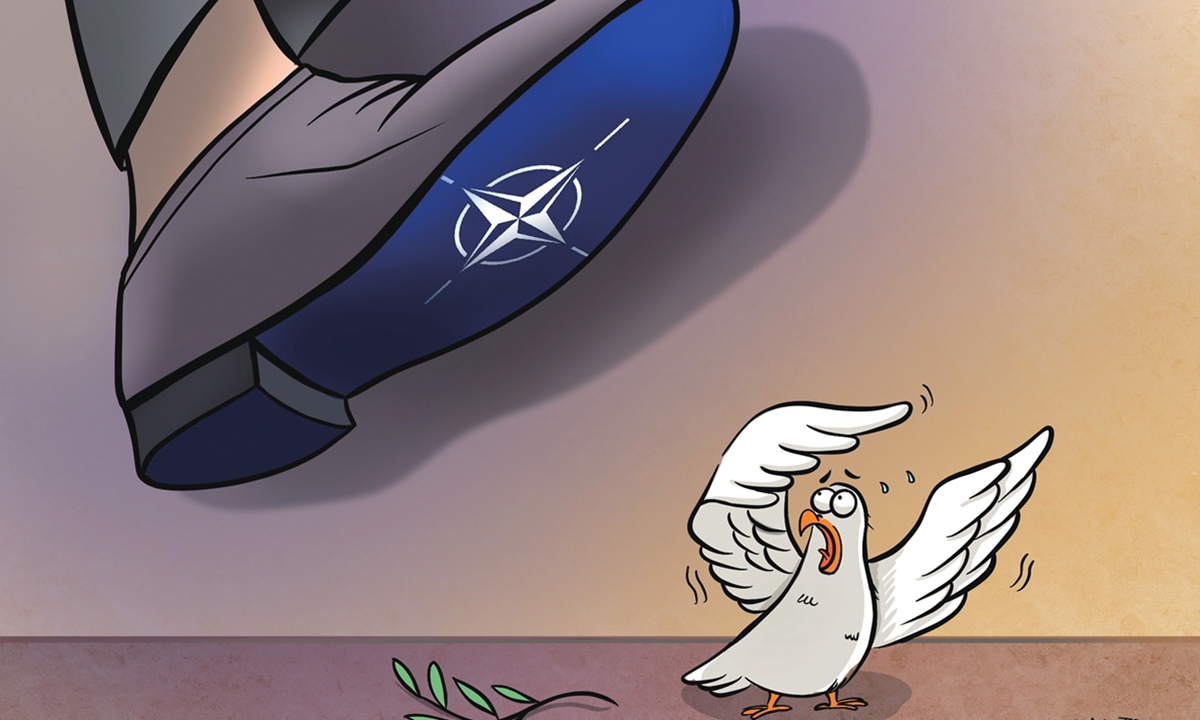
Illustration: Liu Xidan/GT
The North Atlantic Treaty Organization (NATO) on Wednesday kicked off "Exercise Steadfast Defender 2024," its largest military drills since the Cold War. Approximately 90,000 troops from NATO's 31 members and Sweden are participating, with the associated exercises running until May 31. Russian media said NATO has openly admitted for the first time that the exercise is in response to a "Russian attack" and aims to convey to Western populations that "this war is inevitable."
The exercise comes at two crucial junctures - the Russia-Ukraine conflict is entering its third year, and the US is in an election year. The conflict between Russia and Ukraine shows no signs of abating. With the Ukrainian military consistently facing setbacks on the battlefield, NATO, as the instigator of this conflict, has chosen to exert military pressure on Russia. Experts believe that NATO's goal is to continue shaping the "Russian threat," gain support from EU citizens for its anti-Russia policies, and justify further defense spending and economic pressure on Russia.
This NATO exercise will further escalate tensions in Europe, said Wang Xianju, a senior research fellow at the School of Global and Area Studies at Renmin University of China. The conflict between Russia and Ukraine has been ongoing for nearly two years, with the international community advocating for peace. However, NATO is going against the tide, provoking and pressuring Russia through large-scale military exercises, thus creating confrontation across the world.
Meanwhile, the attention and energy of the Biden administration are increasingly consumed by the upcoming presidential elections, making it unable to continue providing the necessary support for Ukraine's conventional warfare. The financial and military assistance that the Western alliance can currently provide to Ukraine is insufficient to sustain its resistance against Russia. Therefore, NATO aims to use large-scale military exercises to deter Russia.
In addition to perpetuating the Russia-Ukraine conflict, another alarming trend of NATO is its attempt to expand into the Asia-Pacific region. The outbreak and prolonged nature of the Russia-Ukraine conflict, coupled with global disorder and changes, have given NATO, which French President Emmanuel Macron once described as "experiencing the brain death," an opportunity to catch its breath and extend its existence, and try to achieve its geopolitical ambitions through wild means.
NATO is not satisfied with its footprint in Europe and North America, therefore it continuously seeks expansion by enticing Asia-Pacific countries such as Japan and South Korea on board. It even follows the US script, hyping up the "China threat" and meddling in Asian affairs. Last week, NATO Secretary-General Jens Stoltenberg claimed that NATO is not moving into Asia, yet China approaches NATO. This argument is extremely absurd and is NATO's preparation in terms of public opinion for further expansion into the Asia-Pacific region. Former Australian prime minister Paul Keating once said that the Europeans have been fighting each other for the better part of 300 years, including giving two World Wars in the last century, and "exporting that malicious poison to Asia would be akin to Asia welcoming the plague."
NATO is the spokesperson and enforcer of US interests, military expert Song Zhongping told the Global Times. NATO is actually dominated by the will of the US, swept up in the panic and tension incited by the US, becoming Washington's axe, spear, and shovel. NATO claims that China's behavior violates "NATO core principles of democracy, the rule of law, and freedom of expression," echoing the US' labeling of China and Russia as the "axis of evil."
As a product of the Cold War, NATO should have been consigned to the trash heap of history after the end of the Cold War. However, under the influence of the US, NATO not only intensifies the crisis in Europe but also plots expansion into Asia. Asian countries must remain highly vigilant to this.




